The buoyant Bangkok property market with its dizzying buying and construction frenzy, has slowed down. Compared to 2018, this year has been quiet for the industry with a lower level of new launches in the Capital and an anticipated general decline in property transfers across Thailand.
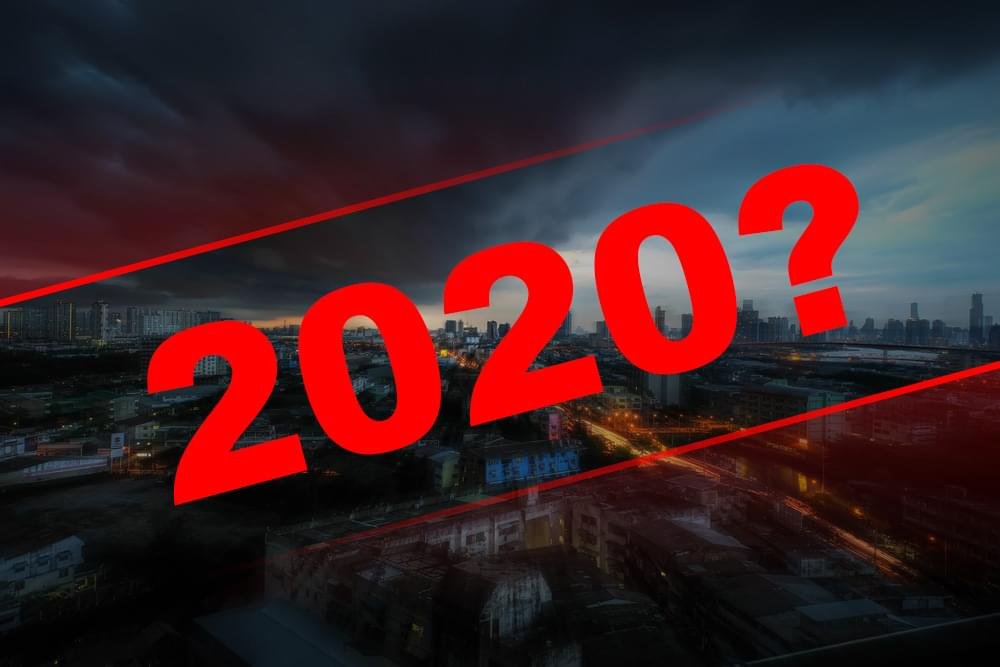
The property outlook is creating uncertainty which is affecting investor and homebuyer sentiments. Creating an “elephant in the room” and leaving a big question on everyone’s lips:
Is there a property bubble in Bangkok?
This issue has divided people for years and the answer is anything but straightforward.
The “Bangkok bubble pundits” are quick to link the slowdown as the symptoms of an imminent crash; the “confident optimists” laugh-off the possibility of a market collapse as improbable considering Bangkok’s economic fundamentals.
Predicting a bubble that could affect people’s financial decisions is a risky affair, which amounts to little more than fortune telling.
Rather than providing a prescriptive opinion, we will instead explore both sides of the coin.
A depressed Bangkok real estate market, symptoms of a bubble?
Developers have started to experience the effects of a slowing market, with many of them forced to scale back on new project launches. Some residential developers are diversifying their operations into parallel business lines, such as apartments and hotels to try and insulate themselves from the slowdown.
According to Knight Frank, new condo launches for the estimated full year are down 27% compared to 2018. The real estate consultancy also reported a drop in Q2 sales rate to 15.7% from 22.6% in Q1’19.
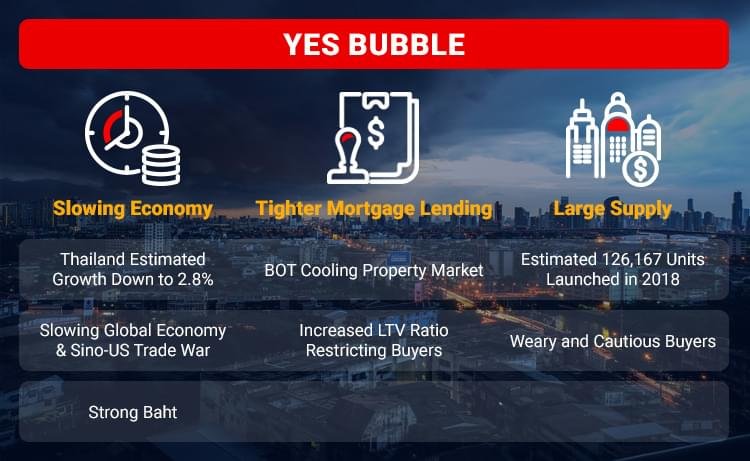
This dip in Bangkok’s real estate market is the result of a combination of factors
1. Slowing global and local economy
The global economy is slowing, and the Sino-US Trade spat is having a knock-on effect especially on Thailand’s Tourism and Export Industries.
The Finance Ministry’s Fiscal Policy Office (FPO) recently reviewed Thailand’s forecasted economic growth downwards to 2.8% from 3% this year.
The strong Baht has also been a nagging issue, dampening the appeal of the Capital’s property offerings to foreign buyers.
2. Tighter mortgage lending and LTV limits
The tighter mortgage lending rules came into effect on April 1st this year.
The tougher rules, favors loan applicants with lower risk profiles, making eligibility to qualify for property loans more stringent.
These were preemptive measures taken by the Bank of Thailand (BOT) to curb speculative buying behavior and to cool what they perceived as an overheating market.
The new rules affect mostly the loan-to-value (LTV) ratio of potential borrowers, requiring 2nd and 3rd mortgage applicants to make larger mortgage deposit payments.
Overview of the changes
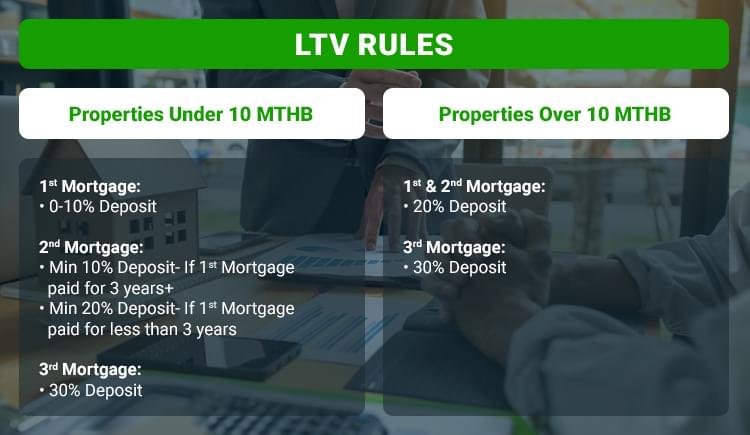
This has curbed appetite of rental investors and speculators that were important parts of the Capital’s real estate ecosystem.
3. Large condo supply and “condo fatigue”
According to the Agency for Real Estate Affairs (AREA), there were 448 Projects or a total of 126,167 Units launched in 2018. The total value of these projects was an estimated USD 17,267 Billion, representing a 9% increase compared to 2017.
The boom years of 2017-18, are still visible all over Bangkok with cranes and condominium constructions littering the skyline.
Billboards, full page newspaper ads and even well-target Facebook sponsored posts continuously touting the latest residential project launches.
This frenzy of activity and constant advertising resulted in a general “condo fatigue” and buyers are weary of “flashy hot offers”. Buyers are increasingly sophisticated and as a result, they are approaching prospective real estate purchases with a mix of caution and skepticism.
Bangkok’s economic fundamentals
It’s not all doom and gloom in the Capital’s real estate market, with many property professionals maintaining confidence in Bangkok’s economy.
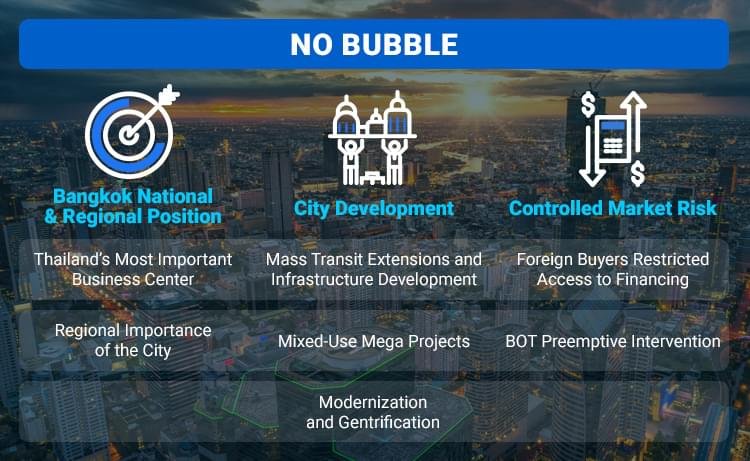
1. Bangkok’s national and regional position
A quick look at Thailand’s urbanization and it becomes apparent that Bangkok with its population of over 10 million inhabitants is the country’s dominant urban and business center. It is also a leading economic powerhouse in the region and a hugely popular travel and lifestyle destination within South East Asia.
The health of the Capital’s real estate market is linked to the growth of the Thai economy. Many property professionals maintain that as long as the Thai economy continues its upward economic trend, Bangkok’s property market will be a natural benefactor of this growth.
2. Bangkok development, modernization and gentrification
The city is developing into an ultra-modern business, commercial and leisure hub comparable to international standards.
The Thai Government, in a bid to maintain Bangkok’s competitiveness are undertaking expansive extensions to the mass transit BTS Skytrain and MRT Underground networks. These new transport links will start to service previously underserved and difficult to access neighborhoods.
Mega mixed-use projects comprised of residential, retail, leisure and office space are going-up in the four corners of the Capital, promising to gentrify entire neighborhoods. These include One Bangkok on Wireless Road, The Forestias in Bangna or even the newly completed IconSiam by the river.
These developments combined with Bangkok’s economic growth are predicted to boost the four corners of the real estate market!
3. Acceptable level of lending risk
Whilst much emphasis is put on the emergence of foreign investors, especially from Hong Kong and mainland China, it is important to note that lending options for foreign buyers remains restricted. Most foreign investors are cash buyers with little options but to sit and hold especially if the market is illiquid.
When reviewing the Thai market, whilst there has been a noticeable uptick in Non-Performing Mortgage Loans (NPLs), it is important to know that the BOT has already taken preemptive steps to cool the market. This may sting the market in the short/ medium-term, as the Central Bank is cautious to stop a “systemic default” of high-risk borrowers.
A slowdown definitely, market correction probably, a bubble no
Bubble or no bubble?
Fresh Property and our dedicated team of sales professionals make money by selling real estate. Rather than sugarcoat things, the truth is that our incomes are determined by our optimism and confidence in the long-term potential of the Capital’s real estate market.
We believe in the long-term fundamentals of Bangkok’s property market and the healthy long-term returns it can generate to savvy investors.
There is no doubt a market correction is underway, and this is a natural result of years of relentless residential development activity.
Investors and home buyers should understand that in a cyclical industry like real estate, ups and downs are completely normal.
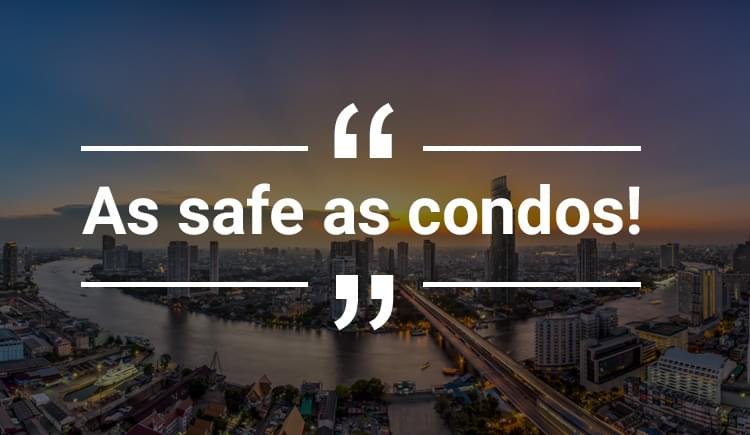
Our Agency believes in the old adage “as safe as houses” or in Bangkok’s case “as safe as condos”.
Rather than worry about macroeconomic factors, buyers should focus on the micro factors. Carefully studying neighborhoods, selectively investing in high-potential projects and acquiring condo units at appealing prices.

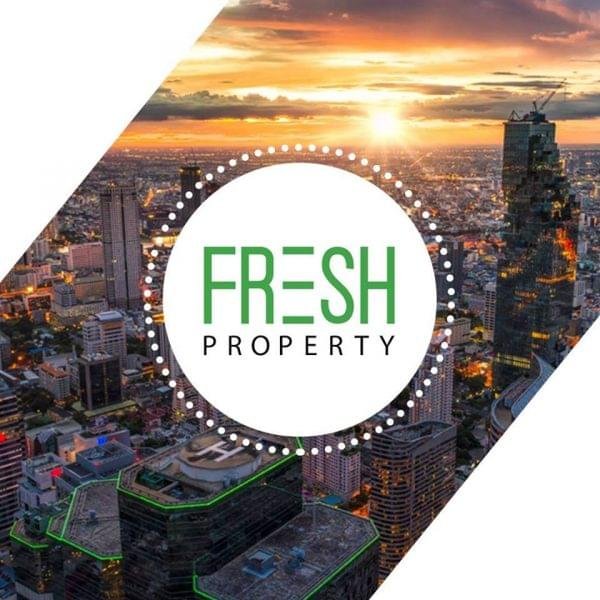
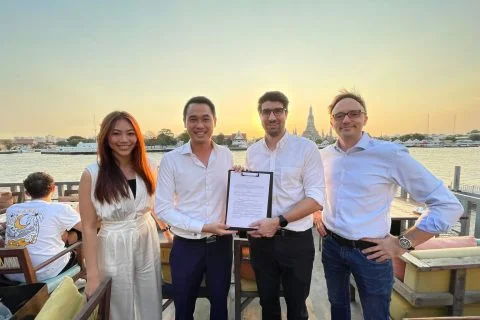


Mark Chamberlain says:
Nice article it really doesn’t tell me anything that I already know..